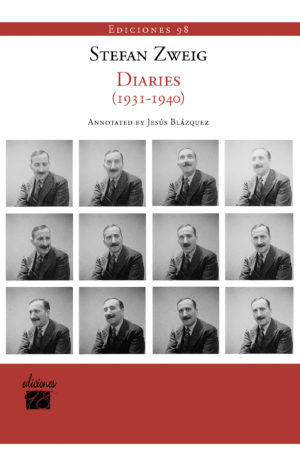Stefan Zweig – Diaries by Stefan Zweig, covering the period from 1931 to 1940, has just been published in English for the first time. Die-hard fans, like me, will want to read this but if you’re new to Zweig’s writing, I’d start with his books or short-stories instead (The World of Yesterday, Twenty-Four Hours in the Life of a Woman or short-story collections). As a companion to his other works, I found this an interesting peek into the author’s mind; as much for the things he doesn’t say as for what he says.
As private diaries go, Zweig’s are mysteriously private. Save one or two snide comments about his ex-wife and a few brief mentions of his new wife, there’s a glaring absence of anything personal. Was he simply a narcissist preoccupied only by his own work (which he has been accused of)? Or did he expect or want this to be read by the outside world (Zweig was world famous at this point)? Unwittingly perhaps, he reveals a thing or two about himself. The streak of humbleness we saw in The World of Yesterday, is less obvious here, replaced instead by a touch of abrasiveness and arrogance.
Personal feelings about the man aside, there’s no denying that he was an outstanding writer and I devoured the descriptions of New York, a city whose gleaming skyscrapers and modern ways of life seemed like another planet from someone coming from old-school Europe.
Our forebears would have stood spellbound by this phenomenon beyond their wildest imagination.
Brazil leaves an equally indelible impression; his portrayal of Rio will make you want to go there immediately. As he moves on to England, where he lived in exile for several years under constant fear that he would be expelled because of his German background, he’s less enamoured. His brutally honest description of Britain as a colonial power sets the tone.
…an insatiable polyp with thousands of ramifications – sucking strength, wealth and energy from the five continents of the world, while transforming the quiet work of millions of people into dynamic splendour…
Watching in horror as Europe edges towards the abyss, Zweig emigrates to Brazil. Two years later, haunted by mental illness and the gloom hanging over humanity so succinctly explained in The World of Yesterday, Zweig and his wife commit double suicide.
More on Zweig from The New Yorker
Stefan Zweig – Diaries by Stefan Zweig is translated and published by Ediciones 98, 130 pages.





